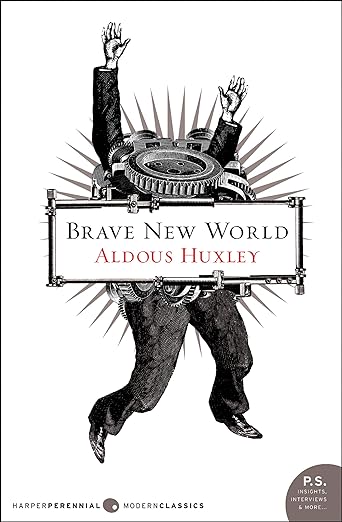Welcome, fellow explorers of literature, to an insightful journey through Aldous Huxley’s dystopian classic, “Brave New World.” In this literary guide, we will delve into the futuristic world of genetic engineering, social conditioning, and the pursuit of happiness at any cost. Join us as we navigate the thought-provoking themes and intricate characters that populate Huxley’s visionary novel.
Introduction
“Brave New World,” published in 1932, presents a chilling vision of a future society where technological advancements and social engineering have reshaped human existence. Set in a world where pleasure and stability are paramount, Huxley’s novel serves as a cautionary tale about the consequences of sacrificing individuality and freedom in the pursuit of societal harmony. Join us as we unravel the complexities of this brave new world and examine its profound implications for our own.
Quick Summary
The novel is set in a futuristic World State where citizens are engineered through artificial reproduction and conditioned to fit into specific social roles. The story primarily follows Bernard Marx, an Alpha-Plus who feels alienated by the rigid conformity of society, and Lenina Crowne, a Beta who embraces the values of promiscuity and consumerism. Their lives intersect with John “the Savage,” a young man raised on a Native American reserve outside the World State, who challenges the societal norms and values imposed by the Controllers. As the characters navigate the tensions between individuality and societal expectations, they confront the fundamental question of what it means to be human in a world governed by technology and conditioning.
Character List and Descriptions
Bernard Marx: An Alpha-Plus psychologist who feels like an outsider in the World State due to his physical appearance and nonconformist tendencies. Bernard’s dissatisfaction with the shallow values of society drives him to seek meaning beyond the superficial pleasures promoted by the Controllers.
Lenina Crowne: A Beta nurse who embodies the values of consumerism and promiscuity promoted by the World State. Lenina’s adherence to societal norms contrasts sharply with Bernard’s skepticism, as she struggles to reconcile her attraction to John “the Savage” with her conditioning to avoid emotional attachments.
John “the Savage”: Raised on a Native American reserve outside the World State, John represents a counterpoint to the artificiality and conformity of society. His exposure to Shakespeare and traditional values fuels his rebellion against the World State’s conditioning, leading to a tragic confrontation with the forces of control and manipulation.
Mustapha Mond: One of the World Controllers responsible for maintaining stability and order in the World State. Mond embodies the paradox of a benevolent dictator, using his knowledge and power to justify the sacrifices made in the name of societal harmony.
Themes
Technological Advancements and Control: “Brave New World” explores the consequences of scientific advancements and technological control over human life. The World State’s use of genetic engineering, conditioning, and pharmaceuticals to maintain social stability raises profound ethical questions about the limits of scientific progress.
Conformity and Individuality: The novel examines the tension between societal conformity and individuality, as characters like Bernard and John struggle to assert their identities in a world that values uniformity and predictability. Huxley critiques the dangers of sacrificing personal freedom and autonomy for the sake of societal harmony.
Consumerism and Pleasure: In the World State, happiness is equated with consumption and instant gratification. The novel critiques the shallow values of consumer culture and the pursuit of pleasure at the expense of deeper human experiences and emotions.
Freedom and Rebellion: “Brave New World” portrays rebellion as both a threat to social stability and a testament to the human spirit’s desire for freedom. Characters like Bernard and John challenge the status quo, highlighting the importance of questioning authority and resisting oppression.
Dystopia and Utopia: Huxley’s novel blurs the lines between dystopia and utopia, presenting a world that is superficially ideal but morally bankrupt. By depicting the consequences of sacrificing moral values and individuality for societal harmony, “Brave New World” warns against the dangers of unchecked power and technological control.
In conclusion, “Brave New World” remains a provocative exploration of the human condition, technological progress, and the consequences of sacrificing individuality for societal harmony. Aldous Huxley’s insightful critique of authoritarianism and conformity continues to resonate with readers, urging us to reflect on the ethical dilemmas and societal challenges of our own time. Join us for more literary adventures and thought-provoking discussions right here at Curvebreakers!
Looking for additional resources? Check out our comprehensive AP English Language and Writing study guide for more assistance on your literary journey. Happy reading!

